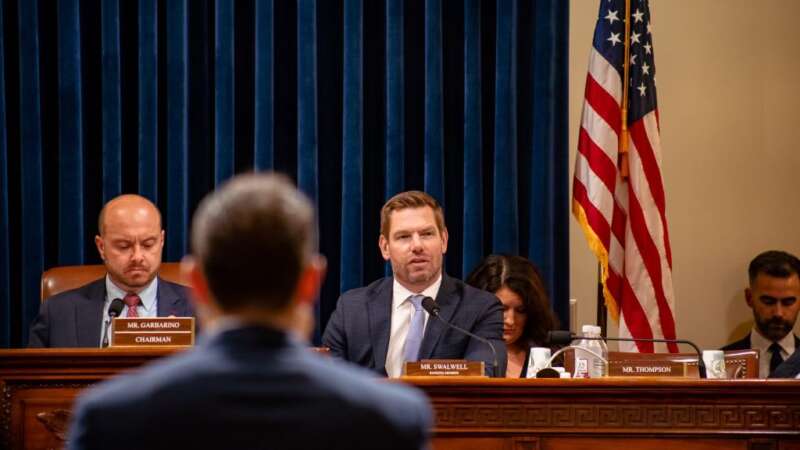
Rep. Eric Swalwell, D-Calif., called out President Trump’s recent cybersecurity executive order (EO) today, asserting that it leaves states vulnerable to future cyberattacks.
On March 18, President Trump signed an order which aims to empower states, localities, and citizens to more effectively prepare for incidents like cyberattacks and weather events.
According to the While House, the EO would enable “state and local governments to better understand, plan for, and address the needs of their citizens by reducing the complexity of Federal preparedness and response policies.”
But according to Swalwell, Federal guidance is needed on cyber defense, and without it states could be defenseless against cyberattacks from adversarial nations like Russia or China.
“The truth is, Idaho or Wyoming or Utah do not have the capabilities to take on China if China is hitting those states or conducting phishing attacks … they just don’t have the same resources [compared] to say, states like California or New York,” Swalwell said at today’s Axonius Adapt 25 event in Washington, D.C.
Swalwell emphasized that “there’s some things that only the Federal government can really be the best partner” for the states.
“Pushing responsibilities to the states, as the President’s executive order does, makes the states defenseless,” he said. “It’s a serious mismatch when you’re talking about who is going to be hitting them.”
Swalwell also emphasized that Federal partnerships are not enough to cover the increasing threats that states and local government are facing. This, he explained, is where funding programs like the State and Local Cybersecurity Grant Program (SLCGP) “can plus up” state and local resources “to harden their defenses against these actors.”
Congress established the SLCGP as a part of the Infrastructure Investment and Jobs Act of 2021. The grant program – which operates under a partnership between the Cybersecurity and Infrastructure Security Agency and the Federal Emergency Management Agency – provides $1 billion in funding over four years.
The SLCGP is set to expire this September, at which point the program will not continue to receive Federal funding unless it is reauthorized by Congress.
Swalwell stated that reauthorizing the SLCGP is an obvious decision and has bipartisan backing. He highlighted that both he and Rep. Andrew Garbarino, R-N.Y., chairman of the House Homeland Security Subcommittee on Cybersecurity and Infrastructure Protection, are committed to reauthorizing the SLCGP, making its continued success a top priority.
Swalwell Calls DOGE Cuts to Federal Workforce Harmful
Swalwell also criticized the Federal spending cuts implemented by the Department of Government Efficiency (DOGE), particularly those targeting reductions to the Federal cybersecurity workforce, which he described as harmful.
The DOGE-led cuts have put tens of thousands of Federal employees out the door, on leave, or on the path to retirement, and further cuts are planned.
“It’s the opposite of efficiency, because people are getting paid not to work, and you’re also going to lose some of the best, because they’re not just waiting around to see if they’re called back to work. They’re taking interviews and planning their future,” Swalwell said.
Swalwell argued that the harmful issue isn’t addressing inefficiencies in the government, and said he supports cutting government waste. But for him, this means digitizing services and streamlining the Federal hiring process.
“If you’re going to make cuts across the board, what you risk with that wrecking ball approach is knocking out important and efficient tools that the government has,” he said, adding that precise and careful reductions to government spending and the workforce would be the appropriate strategy – with national security, cybersecurity, and public safety personnel the last to face reductions.
